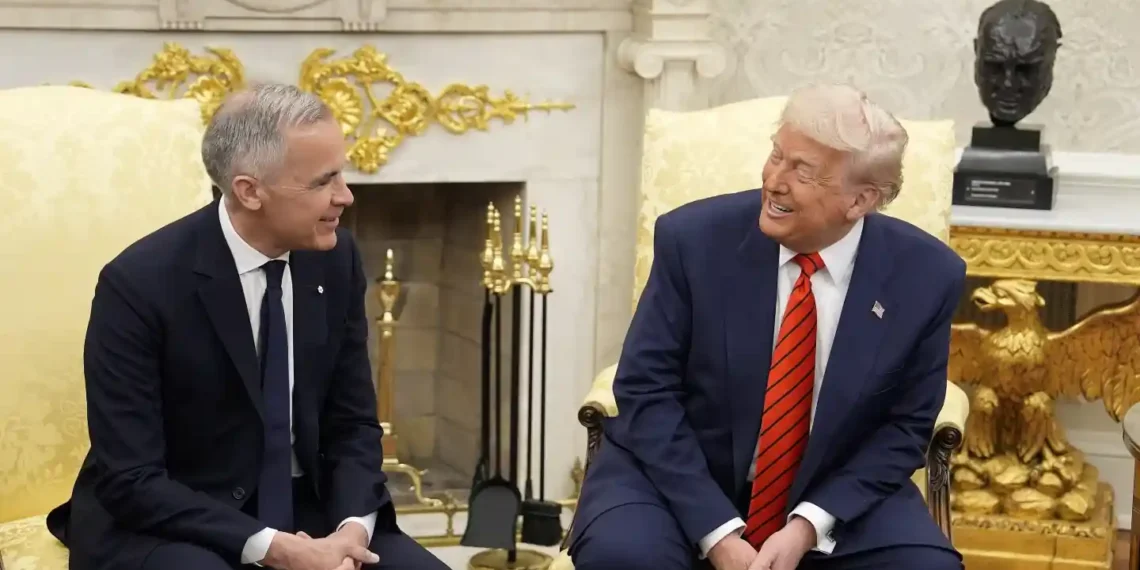Trump and Carney Clash Over Trade, Tariffs, and Canada’s Sovereignty in Oval Office Meeting
In a tense meeting at the White House, U.S. President Donald Trump and Canadian Prime Minister Mark Carney faced off on critical issues, highlighting deep divisions between the two nations in the midst of an ongoing trade war.
The encounter, held in the Oval Office on Tuesday, saw the two leaders maintaining a civil demeanor, but they made no moves to ease their glaring differences. One of the most contentious moments came when Trump reiterated his desire to make Canada the 51st U.S. state. Carney, standing firm, responded, “Canada is not for sale,” to which Trump simply replied, “Time will tell.”
When asked if there was anything Carney could say to convince him to lift tariffs of up to 25% on Canadian goods, Trump was direct: “No. Just the way it is.” Carney, however, acknowledged the larger forces at play in the trade dispute and emphasized the need for extended discussions to resolve the issue.
The Stark Contrast of Leadership Styles
This meeting showcased Trump’s familiar blend of aggression and hospitality. Just before Carney’s arrival, Trump had posted on social media that the U.S. didn’t need anything from Canada, yet he later praised Carney’s election win in person, before returning to his trademark intransigence on policy matters.
Carney, a seasoned economist with experience heading central banks in both Canada and the UK, kept his composure, despite Trump’s constant interruptions. The Canadian leader found it challenging to make his points as Trump veered between subjects, including discussions on California’s Governor Gavin Newsom and Canada’s former Prime Minister Justin Trudeau.
Trump’s remarks about making Canada the 51st state and imposing tariffs were a slap in the face to Canada’s sovereignty and economic standing. The ongoing trade war, particularly over the auto industry, energy resources, and manufacturing, has caused significant tension, and Carney’s Liberal Party benefitted from this climate, leading to a surprising victory in the recent elections.
Carney’s Response: “Canada is Not for Sale”
Trump’s proposal of integrating Canada into the U.S. was firmly rejected by Carney. The Canadian Prime Minister reiterated, “It’s not for sale. It never will be.” While the two leaders disagreed on this point, Carney suggested the true potential of the relationship lies in a partnership based on mutual respect and shared goals.
The tariff dispute continued to dominate the conversation, with Trump expressing his dissatisfaction over the trade deficit. He claimed that the U.S. wasn’t interested in purchasing Canadian-made cars, despite many of these vehicles being assembled in the U.S. He called the $63 billion trade deficit a “subsidy” that needed to end.
Despite the tension, the meeting remained cordial, lacking the hostile tone seen in previous encounters, such as Trump’s public altercations with Ukraine’s President Volodymyr Zelenskyy.
A “Wide-Ranging” Discussion
Following the meeting, Carney described their talks as “wide-ranging” and “constructive,” though he acknowledged that any resolution would be a lengthy process, requiring further negotiations. Carney also privately requested that Trump refrain from referring to Canada as the 51st state, but Trump was non-committal on the matter.
When asked if he would give Carney the same nickname of “Governor” that he had used for Trudeau, Trump chuckled and said, “Maybe not. But this is a big step for Canada.” He ended the meeting by asserting that he thought the relationship between the U.S. and Canada would remain “strong.”
Trade and Security Concerns Remain Key
Beyond the personal exchanges, the stakes of the meeting were high. The discussion covered a wide array of foreign policy topics, including Iran, Russia, Ukraine, and China. A senior Canadian official mentioned that Trump seemed eager to engage in the upcoming G-7 summit in Alberta, Canada.
However, Trump’s consistent claim that the U.S. didn’t need anything from Canada seemed at odds with the reality of their intertwined economies. Canada is a major supplier of energy, steel, and other essential resources to the U.S. Trump’s tariff impositions on Canadian steel and aluminum, combined with his dismissive attitude toward Canada’s military commitments, continue to damage the longstanding relationship between the two nations.
Economic Interdependence Between the U.S. and Canada
Despite the rhetoric, the economic ties between the two countries are undeniable. Canada is the largest foreign supplier of steel, aluminum, and uranium to the U.S. It also supplies critical minerals for U.S. national security. More than 60% of U.S. crude oil imports come from Canada, while about 85% of U.S. electricity imports are Canadian. Each day, $3.6 billion worth of goods and services cross the border between the two nations.
Given the crucial economic relationship, Canada’s government is under pressure to navigate these tensions carefully. Carney has stated that his government will continue to fight for the best possible deal for Canada, taking the time needed to ensure that its interests are preserved while exploring other international alliances.
As the trade war rages on, it’s clear that any resolution will take time, but the outcome will shape the future of U.S.-Canada relations for years to come.
This article was rewritten by JournosNews.com based on verified reporting from trusted sources. The content has been independently reviewed, fact-checked, and edited for accuracy, neutrality, tone, and global readability in accordance with Google News and AdSense standards.
All opinions, quotes, or statements from contributors, experts, or sourced organizations do not necessarily reflect the views of JournosNews.com. JournosNews.com maintains full editorial independence from any external funders, sponsors, or organizations.
Stay informed with JournosNews.com — your trusted source for verified global reporting and in-depth analysis. Follow us on Google News, BlueSky, and X for real-time updates.














